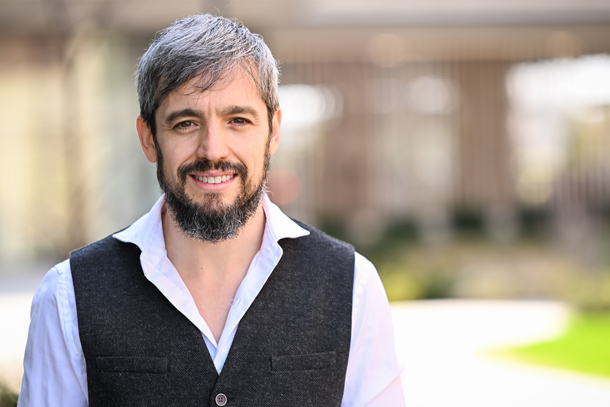
Christian Peco, assistant professor of engineering science and mechanics in the Penn State College of Engineering. Credit: Poornima Tomy/Penn State
Christian Peco receives 2024 NSF CAREER Award
March 22, 2024
UNIVERSITY PARK, Pa. — Christian Peco, assistant professor of engineering science and mechanics in the Penn State College of Engineering, earned a five-year, $549,445 U.S. National Science Foundation (NSF) Early Career Development (CAREER) Award for a project titled, “Transferring biological networks emergent principles to drone swarm collaborative algorithms.”
Q: What do you want to understand or solve through this project?
Peco: Despite lacking brains, organisms like slime molds and fungi exhibit remarkable collaborative problem-solving abilities. This phenomenon is called an emergent behavior and happens when numerous simple agents interact and achieve complex responses. In recent years, my research focus has been on developing computational models to explore the emergent intelligence demonstrated by these organisms.
Through this CAREER grant, I will employ artificial intelligence tools like neural networks to allow swarms of drones to emulate the emergent principles observed in nature. My research will lead to new collaborative algorithms, enabling simple and cost-effective units to complete tasks currently beyond their capabilities.
Q: How will advances in this area impact society?
Peco: By developing advanced collaborative algorithms for multiagent systems, we unlock numerous applications in smart cities and societies. These include enhancing transport logistics, addressing traffic challenges with self-guided vehicles, deploying surveillance and rescue drone systems, and even facilitating autonomous terrestrial excavations and space mining initiatives.
Q: Will undergraduate or graduate students contribute to this research? How?
Peco: This project will involve both graduate and undergraduate students in various research tasks. One of my graduate students is focused on slime mold behavior and two are working on artificial intelligence tools. Currently, an undergraduate student is developing a virtual multi-agent environment, with more undergraduates expected to contribute and a new master's student with a robotics background joining soon. I envision a diverse, collaborative environment to explore the fascinating concepts of emergent behavior and its application to drone swarm intelligence. These scientific concepts will be further disseminated through various educational activities as part of this NSF CAREER.
Q: The NSF CAREER award not only funds a research project, but it also recognizes the potential of the recipient as a researcher, educator and leader in their field. How do you hope to fulfill that potential?
Peco: I understand the NSF CAREER award as the embodiment of the true essence of each scientist's aspirations. It provides a unique opportunity to receive unwavering support from society and the nation to pursue one's passions. Throughout my career as both a researcher and educator, I have challenged conventional norms and sought to pioneer new frontiers in science. This award represents a chance to fully commit to this philosophy and drive success in research while nurturing the next generation of scientists, instilling in them the values of big thinking, curiosity, hard work and societal impact.



